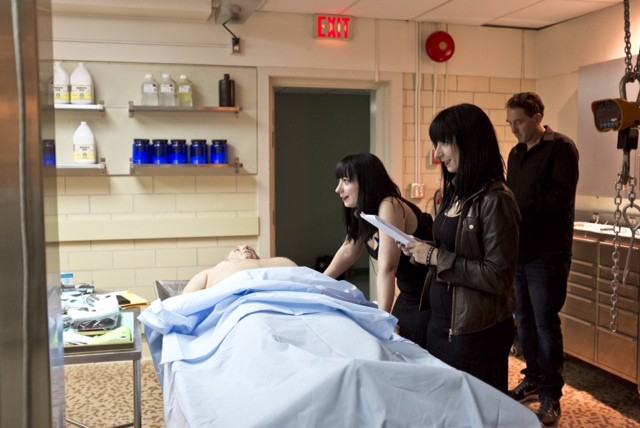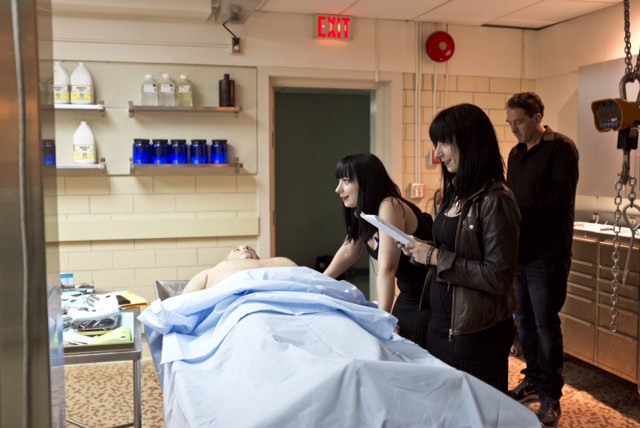A Battle to the Grave: An Interview with the Soska Sisters
by Hayley Krischer


I’m mesmerized by the photo on the Soska sisters’ “About” page. It’s compelling in a gory, expected way; Jen and Sylvia Soska take up the left half of my screen; their shiny, stick-straight hair and pale skin are both completely splattered with blood. They’re identical twins, so it’s a mind trip of sorts, their piercing eyes stare at the camera- — one sister gives that vampy look while the other sister looks like she’s thinking “All in a day’s work.” The Soska sisters are gorgeous and tropey, everything you’d want in horror film stars — -or in their case, horror film directors.
For the past decade, the Soska sisters have been making alternatives to the mostly male-driven horror film genre. Their original female-driven narratives include Dead Hooker in a Trunk, American Mary, See No Evil 2, and the upcoming Vendetta. With American Mary, they created a harrowing rape-revenge film. Mary (played by Katherine Isabelle) surgically removes limbs, sews someone’s eyelids shut and places a vaginal speculum in her rapist’s mouth. (Hell yes.)
I spoke to Jen and Sylvia about the difficult task women have breaking into the male-dominated horror film world (not to mention the male-dominated film world), some of their favorite female-driven horror films and what it feels like to be the recipient of a boatload of misogyny.
I’ve heard you speak about how women aren’t encouraged to create horror movies. But there’s a lack of female directors in the film industry as a whole. In fact, of the top 250 films in 2013, only nine percent had female directors. That’s a remarkably low number — -it must be even lower in horror films.
Sylvia: In the last 40 years we’ve been at the lowest point of having women work behind the camera. Nothing makes me angrier. I know a lot of people working in the industry and I know some brilliant directors and they’re just not getting these kinds of opportunities.
Jen: The thing that infuriates me the most is that so often I see a job that maybe I want to direct, a guy with less credentials who has made less movies with less success and who is getting paid twice as much as what I would be paid is getting the job — -and I’m not even able to get into the room. It so frustrates me that if my name appears, if there is a horror movie that’s being made or being remade, my name is on that list [of directors to talk to], but that’s only to show the perquisite of saying “Oh, we looked at the Soska sisters.”
Also, when someone doesn’t like one of our films, it’s not our films that they criticize, they tear us apart. Usually it comes down to name-calling and saying things as crude as, “Oh, I wouldn’t fuck them.”
Sylvia: [laughs] I hear Woody Allen gets that all the time too.
Do people have an issue that you’re women making movies about violence or gore? That this isn’t the way women are supposed to express ourselves, that women can’t address the horror genre because it’s too messy or bloody?
Sylvia: The first time I really realized it was after I made American Mary. The reviews weren’t as much a commentary on the film, but very hateful, bigoted language against women. Saying things like, “There isn’t a rape culture,” or “Women don’t do this. Men don’t treat women like this.” I was getting very upset by it.
I was talking to my dad, and I said, “I don’t understand, these are things that I’ve gone through. And my dad looked at me and was like, “A misogynist is never going to like your work. They’re never going to like when you put a flashlight on those kinds of issues. Because they don’t want to talk about it. They don’t want to accept it. And they like being that way.”
Jen: I think Syl hit the nail on the head again when we brought light to those issues with American Mary. It really pissed off a certain demographic of men. And I know that our work continues to piss off a demographic of men.
If you ask a man when was the last time they thought a woman was going to kill, rape or murder them — -it’s never! It’s laughable. When you try and bring those issues up, they say, ‘Oh, you’re just being overly sensitive.’ Or one of my favorite things, when someone is overly crude and they say, ‘Oh, honey, you just can’t take a joke.’ I can take a joke.
Sylvia: It’s not only men; I noticed a lot of it in women.
Jen: Yeah.
Sylvia: We’re so critical of each other. We don’t all have to live the same life. Or present ourselves in the same way. It seems like we should be at a time where it’s like, “Good for you, girl. More power to you, sister. I will support you to do that. I don’t want to tear you down because it’s different from my aspect, or my aspirations or my goals.”
I really hate the “You can’t take a joke” thing that men do. It drives me crazy.
Jen: I absolutely agree. I hate it too. When my mother — -she’s retired now, and she produces our films, she and my dad are the best parents ever — -but when she was working, when she was sexually harassed at work, when someone would say something degrading, they would be like, “Oh, honey, you just can’t take a joke.” That’s fucking bullshit.
Sylvia: We have a very fun set, but if someone takes something or says something derogative or something rude to me, I make an example of it and I say in front of everybody, because that cannot be tolerated anymore. And I think that’s why we have such a responsibility to open our mouths. To say what we’re feeling and say, “No. This is not acceptable. Yes, we can all joke around, but we all know the difference between hate speech and a joke.”
Jen: People ask us, “Why do you do this? Why do you speak out so much?” It’s because I want it to be easier for other women. Because there are so many girls who come to us and say they want to be directors. We always say, “Are you sure?” [laughs] Because it’s real shit at times. But it feels wonderful in a way to be trailblazing so that maybe, in a way, if we go through this that we set a precedent…it’s going to be easier for other girls down the line.
Sylvia: There are so many women, like Alice Guy-Blaché and Dorothy Arzner, so many women who came before us and made it easier for Jen and I to do what we do. And there’s a lot of men who are super supportive. Like Michael Luisi, the head of WWE studios. He hired us because he wanted to bring our feminist ideals to their movies. He realized that there’s a whole branch of their audience they weren’t reaching out to. It’s not as bleak as it seems, but it’s definitely going to be a battle that will go on until I’m in the grave, for sure.
It definitely seems that women aren’t allowed to have dark feelings. People get very uncomfortable with that. With American Mary, for instance, I love how you’re able to create a dynamic character with a woman who, well, you don’t expect that this shift is going to happen to this person. There are some mediums that aren’t necessarily a horror genre that have allowed a more grotesque look at women, say, like Twin Peaks. David Lynch has been able to create that kind of dynamic female character. But it’s very rare.
Sylvia: There is such a famine of a representation of women, it’s almost like you have to make an excuse for a female character if she does something that isn’t perfect or proper. But women are flawed. We’re human. We’re just like men, and we can be interesting and crude.
There’s an excellent anthology that’s coming up called XX — -Mary Harron is attached to it and Jovanka Vuckovic and Jennifer Lynch. It’s an all-female [horror] anthology tackling these kinds of issues, where you’re actually hearing [women’s] voices. The funniest thing was that when this project was first announced, there was an onslaught of people saying, “This is sexist. How come there’s no men attached?”
One of my favorite characters in recent cinema has been Mama from the remake of Dread, played amazingly by Lena Headly. She’s not the love interest. She doesn’t have any feelings towards any of the guys.
In Edge of Tomorrow, I was so upset that they forced a love story — -and you see it forced in every film over and over again because that’s how they define women. They just say, “Oh well, there’s a guy and he needs that girl, obviously she has to fall in love with him.” Well, what if he doesn’t actually have that much to offer? Like in Guardians of the Galaxy, I love how Gamora turns down Star-Lord, because…no. Not even a chance.
What are the top three horror films women should be watching?
Sylvia: The very first one I would say is Audition. That’s the first time I’ve seen the true psychopathic nature of a woman represented unapologetically. Women and men make very different villains. And thank god for that.
The second would be Excision directed by Ricky Bates. It is another unapologetic female lead who is also very deeply flawed. It doesn’t make any excuses — -and it goes into sick perversion. The [main character] isn’t dolled up to be beautiful, she’s a very awkward teenager. The whole psychopathic tendencies of a young teenage girl is beautifully represented.
And the third one would definitely be Stoker. It’s such a beautiful, refined look at how people go into their darker natures. It’s a female lead — you’re brought into it so gently. And it’s professionally, artfully done.
Jen: And it really examines her relationship with her mother and her relationship of where we are in the world and what it means to become a woman from a teenager, and that transition. They’re beautifully done films. Am I right that all of these films were directed by men?
Sylvia: Yes.
Jen: All of them are directed by men, so it’s not one-sided. I find the boys club does not exist with the directors that I’ve come to. If you’re a director — -you’re a director. They treat you at the same level. Not like some of the older directors from a different generation.
Sylvia: Oh, you mean Oliver Stone?
Jen: [laughs] Yes.
This interview has been condensed and edited.
The Soska sisters’ most recent film, See No Evil 2, will be available On Demand and Digital HD on October 17th, and on Blu-Ray/DVD on October 21st.
Hayley Krischer is a writer living in New Jersey.